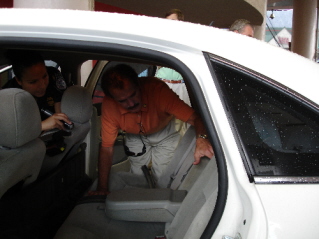Narrowly divided US Supreme Court Tuesday refused to expand police search powers at the expense of privacy rights, ruling that police cannot search a suspect’s vehicle after the suspect has been detained and arrested absent probable cause. The 5-4 decision came in Arizona v. Gant.

In that case, Rodney Gant was a suspect in a drug investigation. As Tucson police surveilled a suspected drug house where they had come into contact with Gant earlier, Gant drove up and exited his vehicle. Having checked Gant’s record after the earlier encounter, police knew he had an outstanding arrest warrant for driving with a suspended license. Police arrested and handcuffed Gant, then placed him in the back of a patrol car. Police then searched his vehicle, finding a gun and some cocaine. Gant was charged with and convicted of drug possession and sentenced to three years in state prison.Before trial, Gant had sought to suppress the evidence against him, arguing it was the result of an unlawful search, but the trial judge denied that motion. Gant appealed the verdict, winning in the Arizona Supreme Court. The state of Arizona then appealed to the US Supreme Court.
To no avail. While the Supreme Court acknowledged police powers to make a search incident to arrest, the justices noted that the purposes of such searches were to ensure officer safety and the preservation of evidence. With the suspect cuffed in the back seat of a patrol car and with no reason to preserve any “evidence” of Gant’s offense — driving with a suspended license — the court held that police needed a search warrant to conduct a search of his vehicle.
“Police may search a vehicle incident to a recent occupant’s arrest only if the arrestee is within reaching distance of the passenger compartment at the time of the search or it is reasonable to believe the vehicle contains evidence of the offense of arrest,” wrote Justice John Paul Stevens for the majority. “When these justifications are absent, a search of an arrestee’s vehicle will be unreasonable unless police obtain a warrant or show that another exception to the warrant requirement applies.”
A rare victory for the Fourth Amendment from the Roberts court.
